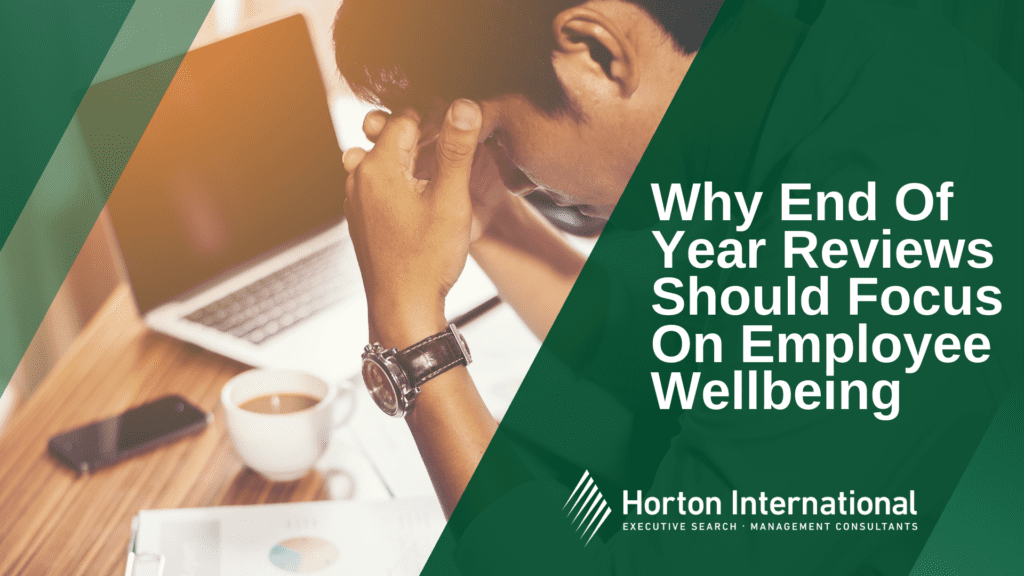Key Highlights
- 44% of newly remote workers said their mental health had declined since the outbreak of the pandemic.
- 38 productive days are lost per employee due to absence.
- 48% feel isolated or lonely as a result of working from home
- End of year reviews can cause stress for employees and it’s essential to alleviate these concerns.
We recently looked into how COVID-19 has changed the way we work for the better, but end of year reviews are yet another aspect which are not going to be the same as they once were. You might be considering how to conduct an effective end of year review over Zoom, or how to accurately review productivity for teams that have been remote working. These are important aspects to consider, but we believe the primary focus should be elsewhere this year; how are your employees really doing on the inside?
Why Is Employee Wellbeing So Important In 2021?
Employee wellbeing is more important than ever and focusing your end of year reviews on overall health and wellbeing makes perfect sense this year. The last two years were stressful not only due to the high levels of uncertainty, dismissals and the looming threat of the pandemic, but also because the social needs of employees were not being met. Team members are feeling less connected, there is an increased sense of loneliness and isolation and financial concerns have been weighing on employees’ minds during the pandemic.
Many workers around the world were suddenly forced to work from home, often times they were also juggling childcare and home schooling as well as their ‘day job’. Chats in the corridor were a thing of the past, no social interactions or lunches with colleagues took place. We are social beings, and this has had a real negative impact on many people.
Globally, large numbers of employees are currently suffering with poor mental health. A survey from EY shared that 44% of newly remote workers said their mental health had declined since the outbreak of the pandemic. It is no surprise that a team that is struggling with their mental and physical wellbeing will never be as productive and efficient as a team that is satisfied and well supported.
On average, each employee loses 38 productive days every year due to both absence and presenteeism, so anything that can be done to reduce this is going to be beneficial to both business and team members.
The Chartered Institute of Personnel Development (CIPD) revealed that supporting and promoting wellbeing among employees can result in a mutual benefit to businesses, people, economies and the wider society. While you might have a wellbeing programme in place, or various initiatives to promote healthy habits, such as organising non-work activities online, checking in on your colleagues and team more frequently or arranging virtual health classes, end of year reviews are an excellent way to reinforce the message that you are on hand and care about their wellbeing.
End of year reviews can be a stressful experience for employees even in years that have not been affected by a global pandemic. It is essential that management teams are mindful that end of year reviews could add more anxiety and stress to an already difficult year for employees.
How To Focus On Wellbeing During End Of Year Reviews
The chances are, you have completed many end of year reviews over your career. Traditionally, the focus would be on performance, KPIs and achievements throughout the last 12 months. Switching that focus to your employees mental and physical wellbeing, whilst still looking to boost team performance, can be a struggle. Here are a few ways you can focus on wellbeing and create a supportive work environment during your end of year reviews;
Ditch The Fixed Mindset
End of year reviews can often leave employees feeling that their performance is based on fixed abilities. It can feel like each individual has no power to make changes or improve with each review. This can leave your team feeling inferior, inadequate or like they have failed at their job. Adopting a growth mindset over a fixed mindset can help boost wellbeing and positivity among your team.
Emphasise that there are always tangible, concrete actions that can be taken in order for an employee to learn, grow and improve in their role. When you have a growth mindset, your end of year reviews become a stepping stone to helping employees reach their full potential. This can leave your team feeling inspired, motivated and ready to tackle the next year ahead, no matter what challenges it might bring.
Show Compassion
It can be easy to go into an end of year review armed with numbers and figures about an employee’s performance over the last 12 months. You might already know what you want them to improve on going forward, or the areas they haven’t been doing so well in.
When you are focusing on their wellbeing, it is important that you approach the end of year review with compassion and empathy. Be understanding towards the struggles they might have faced this year and discuss what can be done to better support them in the future. Check in with your team about their mental and emotional wellbeing. Make sure they know that their mental health is a top priority, and that comes first over performance.
If your employees are struggling, show them some leniency and flexibility. This year has been tough for everyone, with many employees juggling working from home alongside caring for family, or battling the loneliness of quarantines and lockdown.
Remove Competitive Culture
Some companies like to use numerical rankings and comparisons to other employees during end of year reviews. These rigid ranking systems can leave individuals feeling undermined and disregarded and result in them being less likely to respond to any feedback you might give.
Numerical rankings within teams can pit workers up against each other and create a competitive culture in the workplace. For the sake of both wellbeing and productivity, it is better to have a focus on team collaboration rather than competition. Keep end of year reviews solely about each individual employee, as opposed to comparing them to the rest of the team.
Check In Regularly
After end of year reviews are over, it can be easy to just slip back into old habits and return to business as usual. One of the best ways to boost wellbeing among employees is to check in regularly. Keep lines of communication open between yourself and your teams.
Don’t wait for the next performance review to come around to let employees know if they are meeting expectations or have areas where they can improve. Be sure to have regular conversations with your team about the challenges they are facing and what you could do to help support them. Take time to truly understand your employees’ needs and respond to their struggles.
This could be the perfect time to reimagine your end of year reviews to focus on the issues that need addressing that not only help your employees to thrive, but to help your business to show that it really does prioritise your most important asset.








